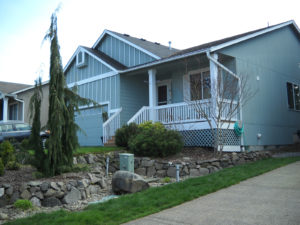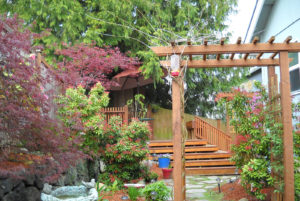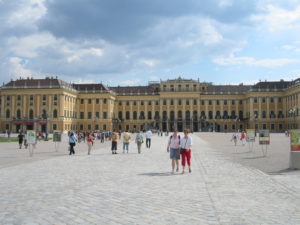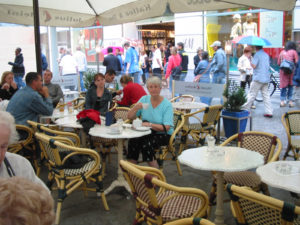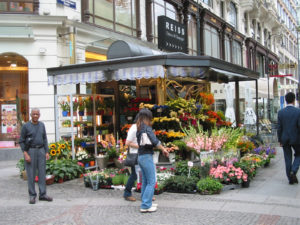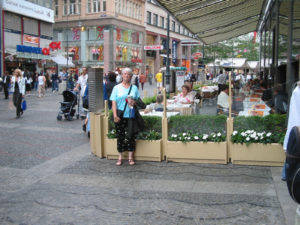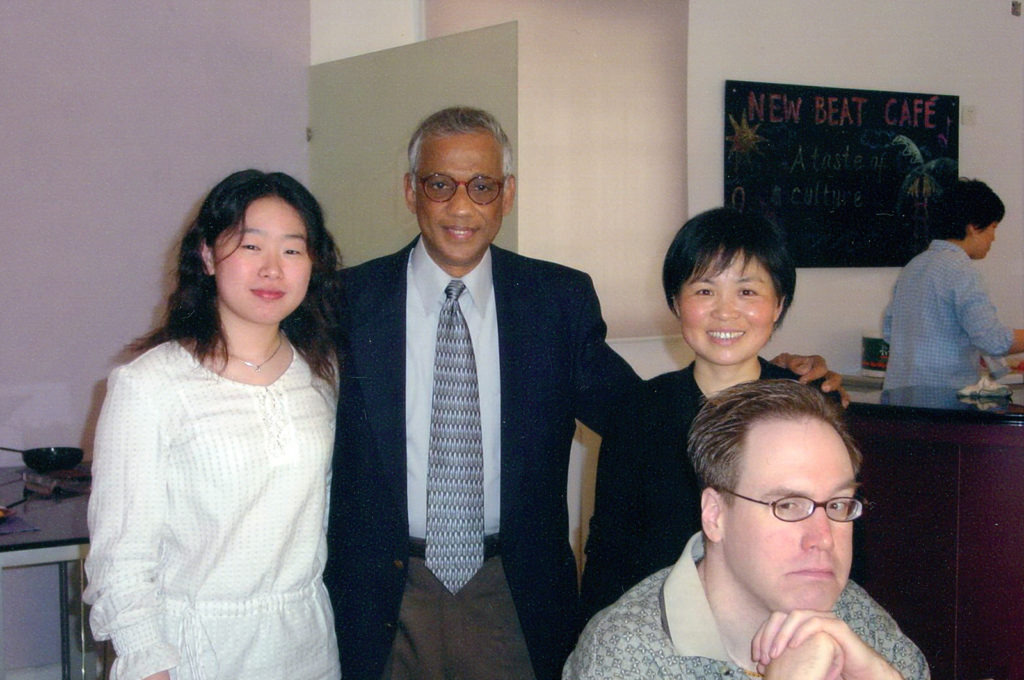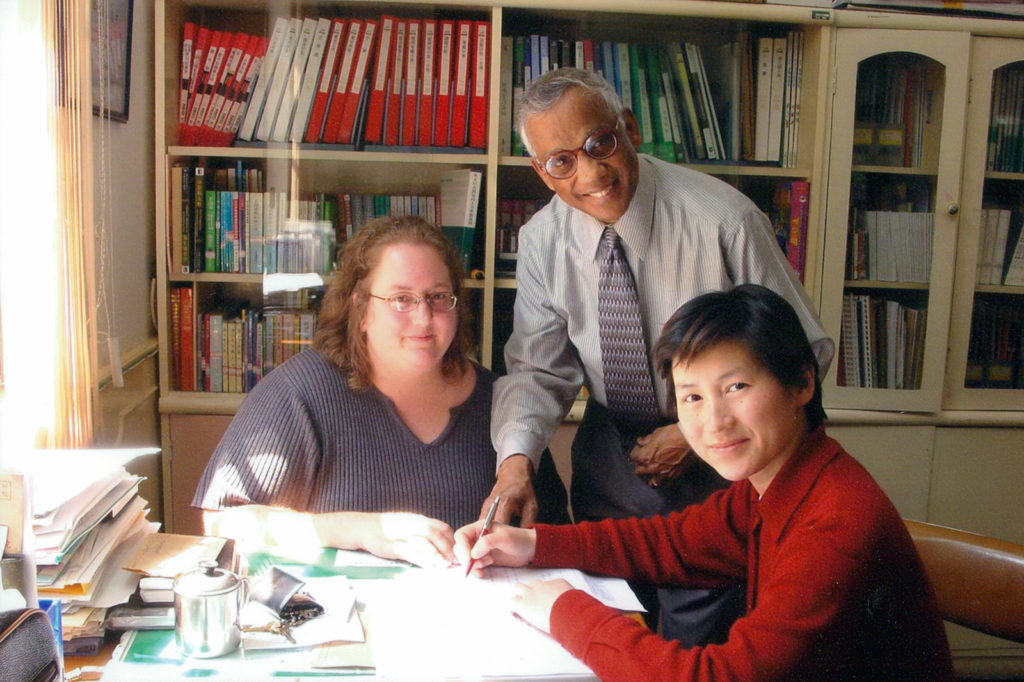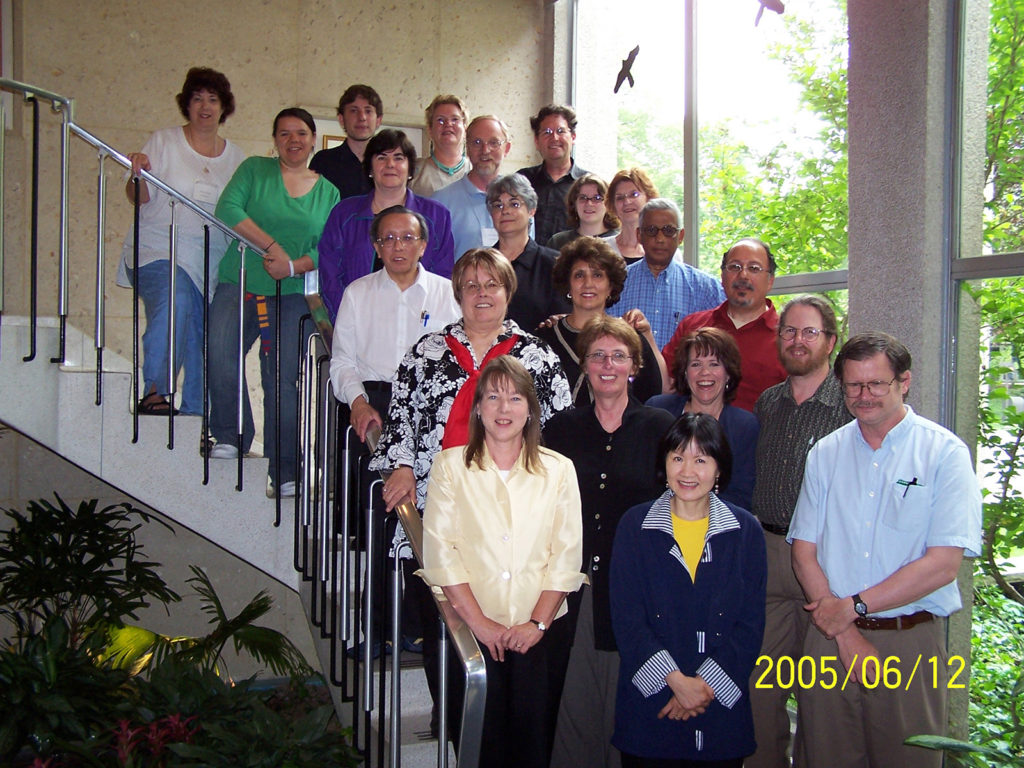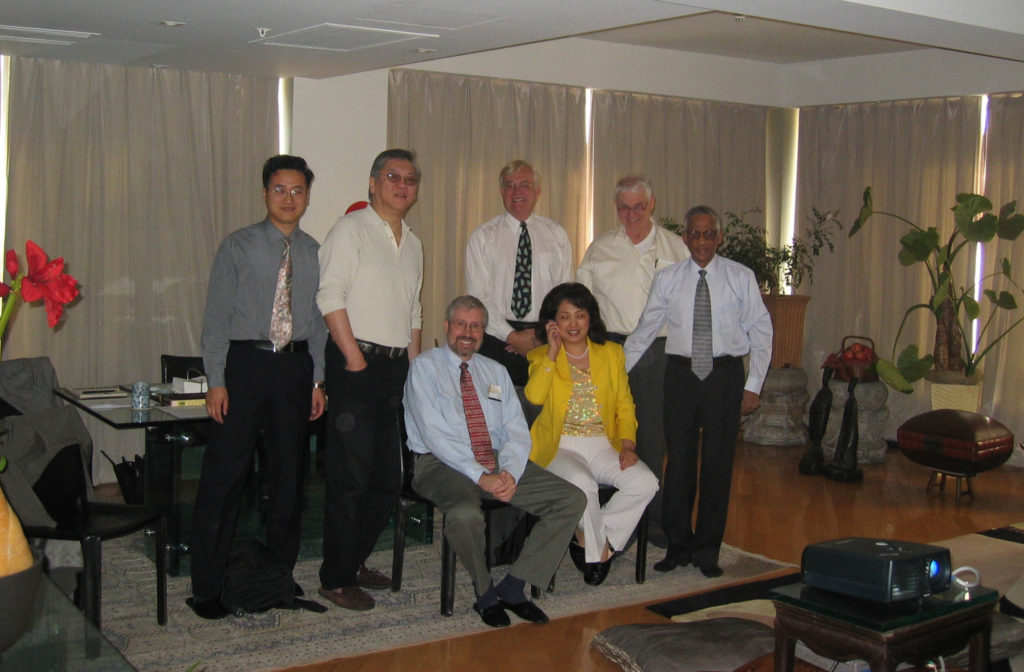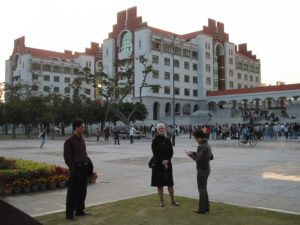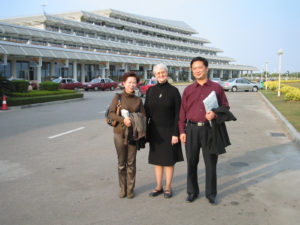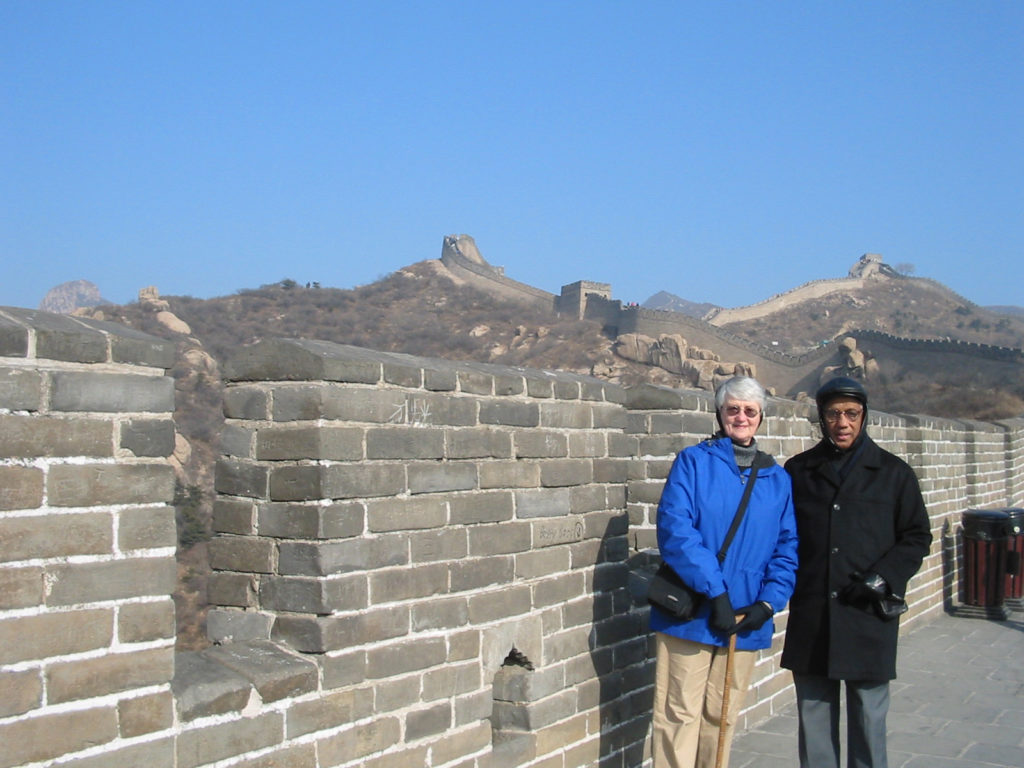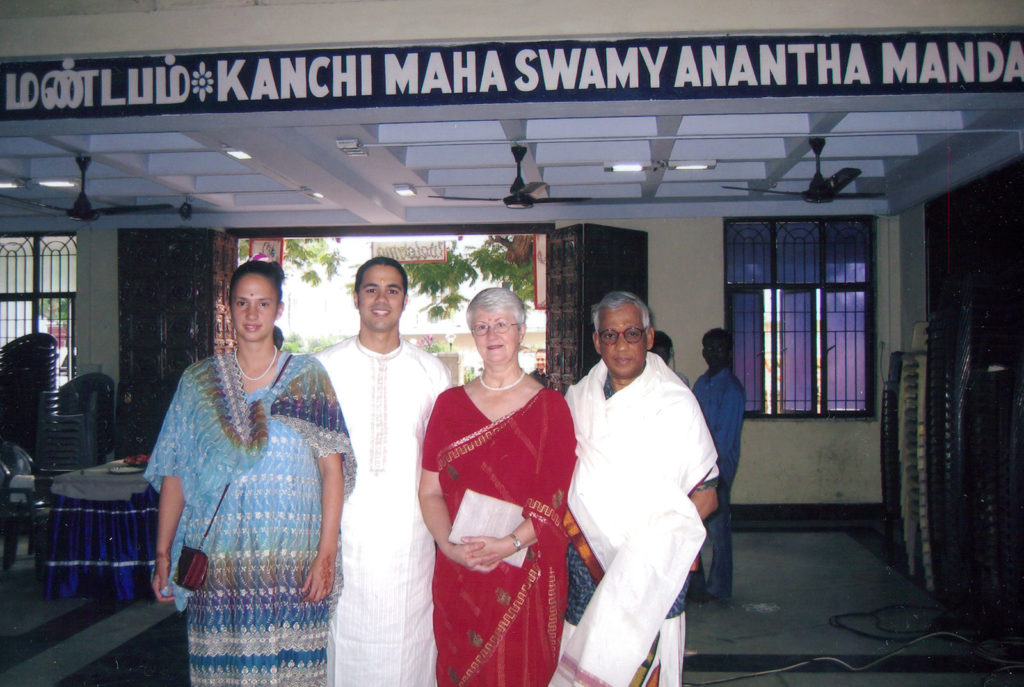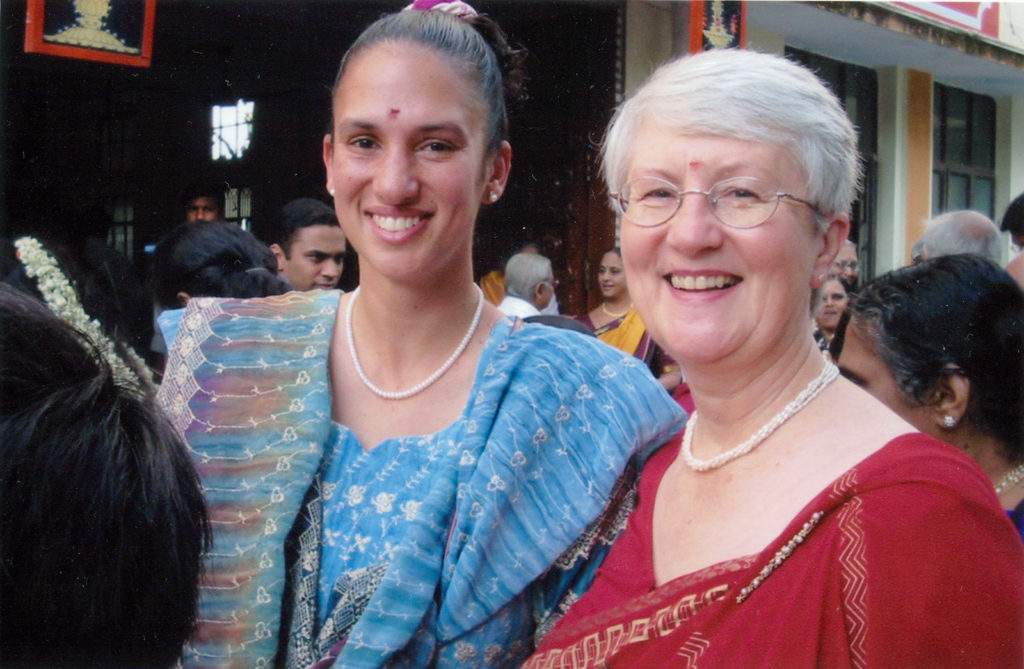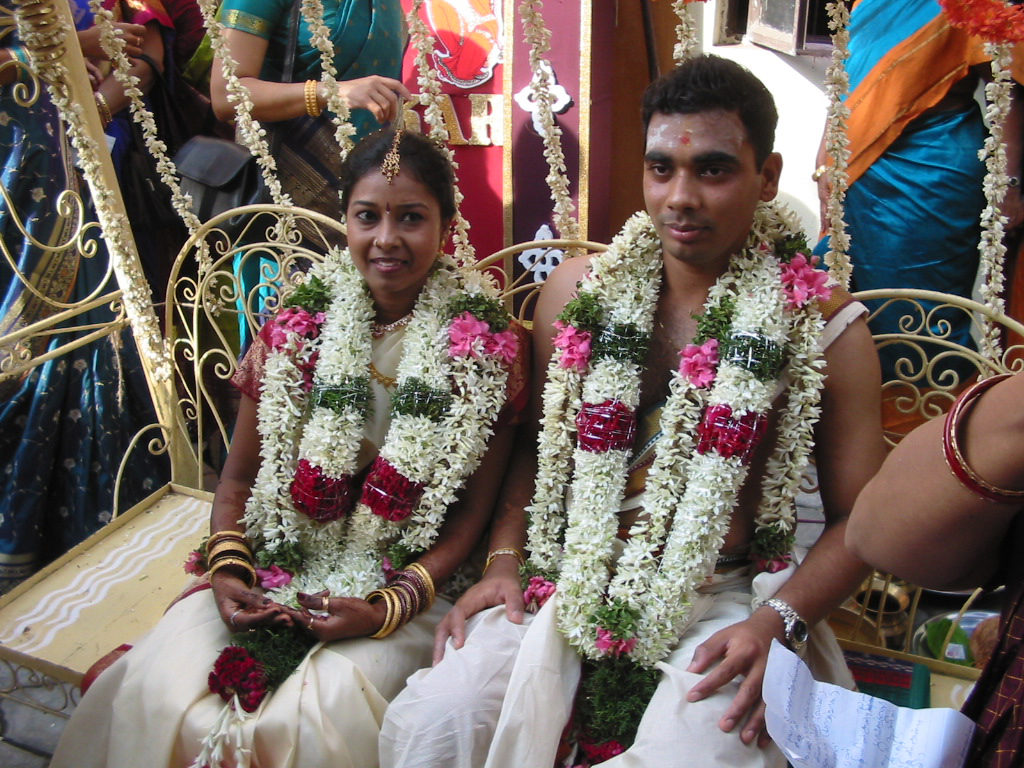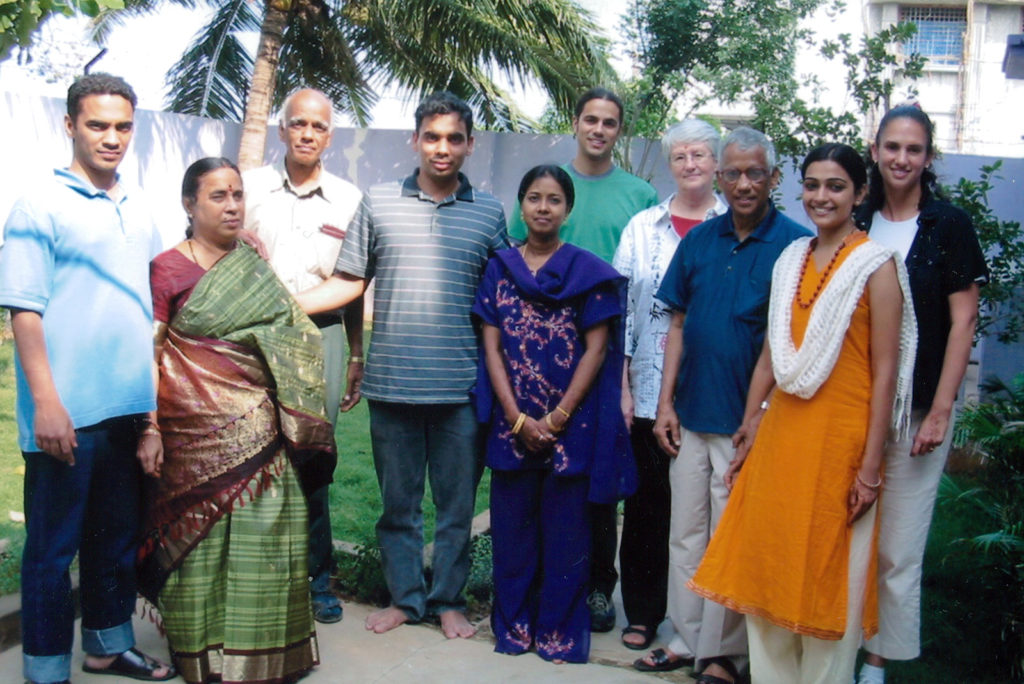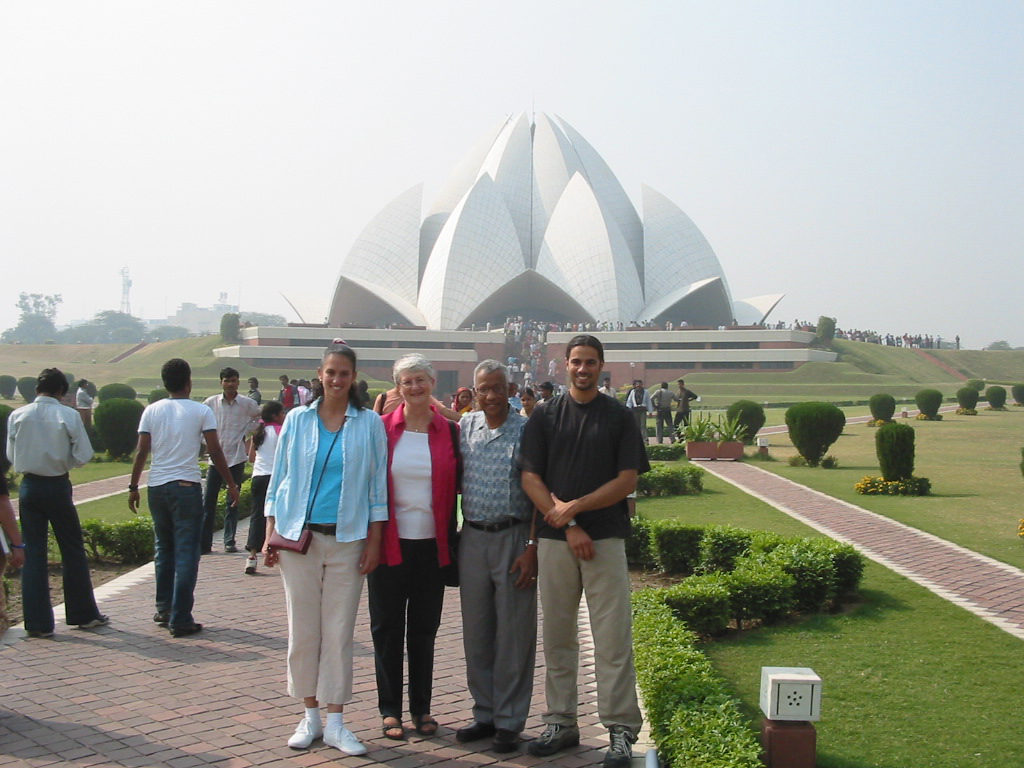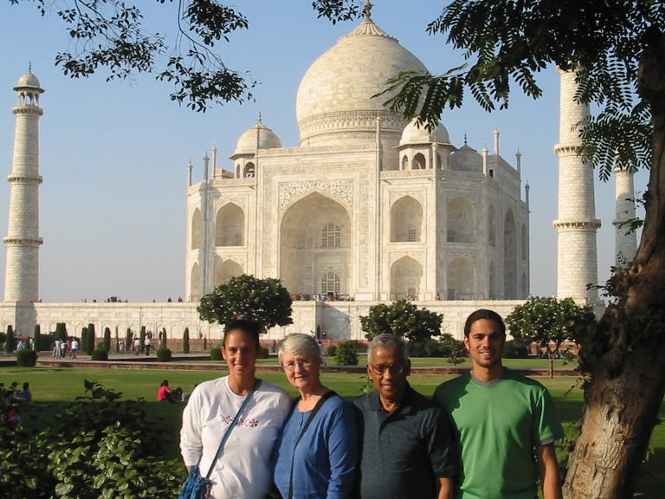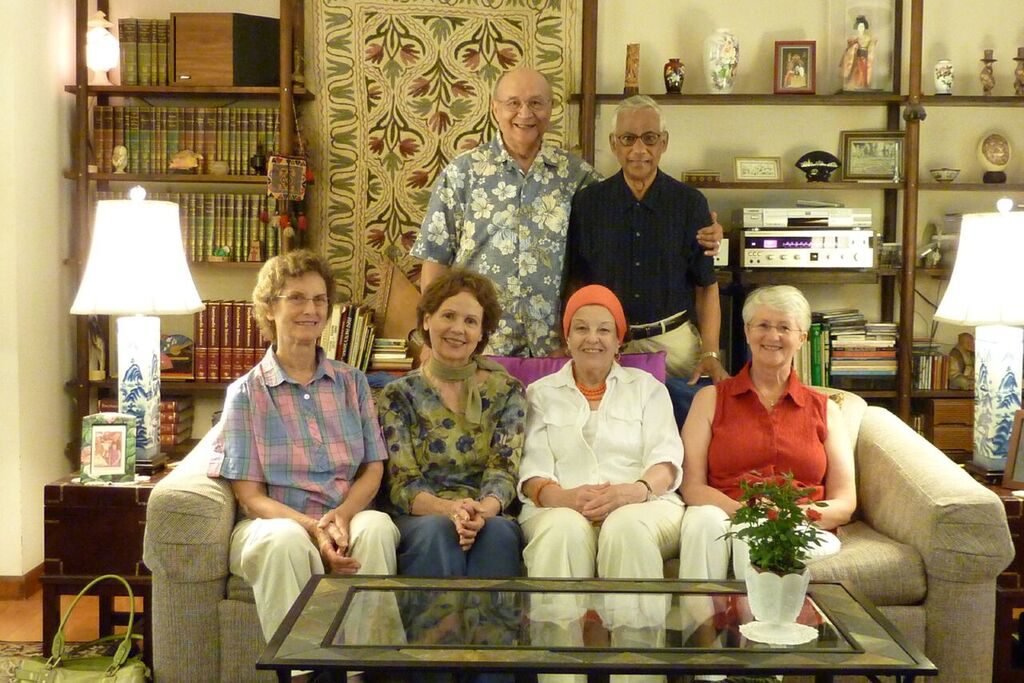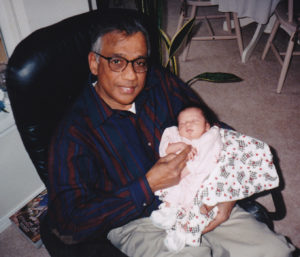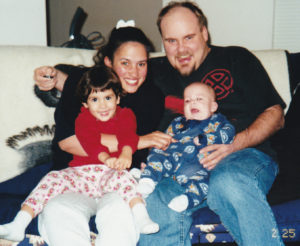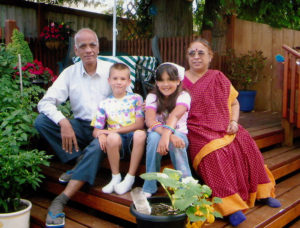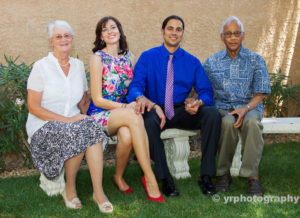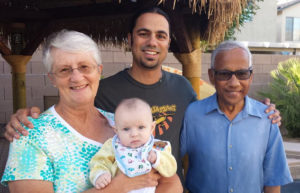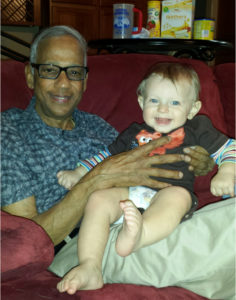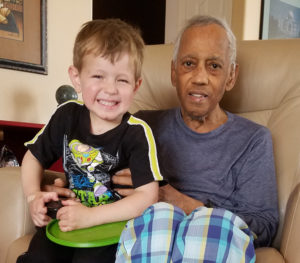An Unpredictable Affair with SPU
When we moved to Auburn I continued giving my talks on comparative religion under the title “Universals in Religious Experience” as a service to the community in fostering understanding and religious tolerance. In January of 2000 arrangements were done to give these classes in the Auburn Public library. With the approval of the Auburn Local Baha’i Assembly to publicize the presentations, I approached the local news paper, the Auburn Review, which sent an enthusiastic journalist to my home to interview me. He wrote up a fine article on the event giving a short background if my life. At the end of the article he casually mentioned that Dr. Raman was also a faculty member at Seattle Pacific University teaching Special Education courses.
The following week I got a call from SPU’s Director of Public Relations requesting a meeting with him. Two other colleagues were also at the meeting. They wanted to know the purpose of my public library presentations. I explained that as a Baha’i, and therefore a believer in the Oneness of Religions, I had been making these community presentations as a way to educate the general public about the teachings of the non-Judeo-Christian religions and to increase understanding and inter-religious unity. There was an immediate reaction from the director of PR who said (to use his actual words) that I was “preaching a philosophy that is contradictory to the Fundamental Christian Teachings” and that this was not to be permitted by the SPU Board. I responded that not a word has been uttered at any time about the Baha’i Faith in the class or on the University Campus, and they were free to make a survey of the students to verify my statement. Nonetheless, they felt that my personal philosophy as a Baha’i would always influence my presentations. The next week I received a letter from them in which they conveyed their decision terminate my program as of April that year. I was shocked; this was beyond belief. But an inner voice comforted me. It told me not to worry and to remember the assurance that Baha’ullah has given: “If you are overtaken by affliction in My path or degradation for My sake, be not be troubled thereby. Rely upon God, thy God and the Lord of your fathers.”
At the suggestion of my colleagues, I filed a complaint with the Washington State Attorney’s Office, explaining that this was discrimination in the workplace on the basis of religion, which is a civil rights violation. I located a lawyer, ironically named Needle, who had experience with such cases. Mr. Needle closely examined the matter and explained to me that this case, though it is was a clear violation of my civil rights, could not be filed sinces I was a contract worker for SPU and not an employee on their payroll.
With a great faith in the unknown and an optimistic outlook toward the future, I wrote to and met with decision makers at Antioch University, Tacoma Community College, and Edmond Community College. Of these, only one, Ms. Linda Campbell of Antioch University, responded to say that she understood the reason for what had happened with SPU. She said she knew very well of many such discriminating practices by SPU. Her specialty was teaching through multiple intelligences and she was directing a center called Center for Community and Professional Learning (another name for a Division of Continuing Education) at Antioch as an adjunct faculty under a grant from Microsoft. She asked me to make a presentation of my program at SPU to the Curriculum Committee and some key members of the tenured Education Faculty at Antioch. I took three more members of the CPLA team with me: Ms. Joyce Montgomery of the Bremerton High School Special Education Department; Mr. Rick Bily, a reading specialist in the Sumner School District; and Ms. C.J. Dorsey, an African American who was the Program Supervisor at the Office of Public Instruction in Olympia. I began the presentation with this statement: “There are three kinds of groups in the world. The first kind makes things happen. The second sees what is happening. The third wonders what has happened.The CPLA team belongs to the first kind.” The four of us made a three-hour presentation which included a PowerPoint presentation and other audio-visuals. The audience was impressed.
The following week Dr. Campbell gave me the good news that Antioch’s Dean of the School of Education, Finance Officer, and University Lawyer had given a green light for my proposal. Now I had to wait until the program was approved by the Superintendent of Public Instruction in Olympia. This was a requirement since this Special Education Endorsement was a new program for the University. The approval came in four weeks and we were all set to start the program on June 1st 2000. Dr. Campbell generously agreed to terms similar to those that we had with SPU, but she gave us classrooms on the Antioch Campus at no charge. The courses were advertised in Antioch’s Summer 2000 catalog and we started with eight students, three of whom were in the previous batch at SPU. For the next ten years I was busy every Saturday (except for the summer months) delivering the courses at Antioch — the longest stretch in my professional career at any time. The Special Education Endorsement program was a success and I officially retired in 2010 at the age of 79.
Beginning shortly after our move to Auburn, Nana worked evenings and weekends in the J.C. Penny department store in the South Center Mall in Tukwilla. She resigned after a year as she did not like sales. She then volunteered to work in the kitchen at the Senior Citizens Center, but soon got a paid position with them. She could walk to work and enjoyed working in this center where she developed some close acquaintances with whom she is still in touch.
One of the highlights of events during this period was the visit of my brother Srinivasan with his whole family. Srinivasan, wife Gomathi, and their daughter Priya came to our home, and then their sons Anand and Bhaskar, who were already in the USA, joined us. We had a wonderful family gathering for about a week. It was heartwarming for me to see Nana and Gomathi working together elbow-to-elbow cooking all the delicious meals. What a change since their first meeting in Rourkela in 1977! Nana and I took them sight-seeing in Seattle, and also had a memorable trip to Snoqualmie Falls. Shaku and her family joined us for a pleasant and joyful family picnic at the Northwest Trek wild animal park in Eatonville.
Fellowship at Shantiniketan
Shantiniketan University, situated not too far from Calcutta, is a well-known seat of higher learning. It was the brain child of Nobel laureate Rabindranath Tagore, and he called it Visva-Bharati, which means “communion of the world with India.” In the spring of 2002 the Chancellor of Shantiniketan University visited Antioch University and was given a warm welcome luncheon party, which I attended, by Antioch’s President. The Chancellor was pleasantly surprised when I chatted with him in Bengali, which was his mother tongue. During the conversation he casually mentioned that he would be happy to have me come to Shantiniketan as a visiting professor to teach in their Education Department. I followed up on his cue and in the next month got an invitation to come to Shantiniketan for a three-month period. They would provide room and board in their International Hostel. Surprisingly, the letter also indicated clearly that my travel expenses from Seattle to Shantiniketan would be reimbursed. I could not have gotten a better deal. With the OK from Antioch, I designated Mrs. Joyce Montgomery, a member of the CPLA team, to run the Special Education program during my absence, which she gladly did.
On my way to Shantineketan I visited with my father who was then in Surat where my bother Srinivasan was employed. I had a professionally successful tenure at Shantineketan, and I taught a course in Human Development during the three months. I was also invited by the Department of Religion on many occasions to give talks on the Baha’i Faith to the students as guest lecturer. I got my article on “My Quest for the Fulfillment of Hinduism” translated into Bengali by an eminent professor in the language department. The student body and the faculty were extremely glad to have me in their University. The only disappointment was that the University did not honor the commitment they made to reimburse my travel expenses from Seattle in spite of several appeals. They however reimbursed the fare within India, from Surat to Shantiniketan, instead.
Move to Spanaway
We lived for seven years in Auburn and got to know the neighborhood well. It was a town-house duplex, and as time went by Nana was not happy about the constant noise that was coming from the attached unit. We looked for a piece of land to build our own house in the neighborhood, but instead settled on buying a house in a new development in Spanaway. We selected a plot and chose the design of a three-bedroom ranch house. The construction was satisfactory, but it was not according to the plan that was promised. It had four steps on the front porch and four in the garage, which defeated the purpose of selecting a ranch house design in the first place. Also, the completed house was a mirror image of the model home that we were shown. Nana worked hard in the backyard to grow a nice garden, erected a patio around the back yard tree and as usual made the house comfortable.
Visit to the Czech Republic and Austria
In June 2004 my dear friend and colleague Don Streets invited Nana and me to attend “a week of retreat and reflection” for those who had been part of the Anisa Project. This was to be held at the Townsend International School in a town called Hluboka, 100km from Prague, the Czech capital. Nana was very excited at the prospect of a trip to Europe and there were enough air miles accumulated to cover her ticket; this was the best chance for us to make a trip to Vienna and Salzburg, Mozart’s birthplace in Austria. We spent the first week in Hluboka and enjoyed the blissful and serene environment of the Townsend School. Nana and I walked to the castle and visited the historic kitchen with its displays of original vessels and equipment. We then spent two days in Prague and got a good taste of the East European culture. We proceeded to Vienna by bus and stayed for a week sightseeing the castles and more importantly the Schonbrunn Palace. We frequented the famous Viennese pastry shops and attended a Mozart concert in the renowned Musikverein symphony hall of Vienna. We then took a tourist van to Salzburg, Mozart’s birthplace, and enjoyed seeing the museum. It was truly an uplifting and memorable trip.
China Projects
In the Spring of 2003 I got an opportunity to work as a consultant for a private educational outfit in Shanghai called New Jazz Institute, run by Ms. Fong, a Hawaiian Baha’i of Chinese origin. She had a unique program of teaching conversational English to elementary school children in the Chinese schools through music and dancing. The lyrics were very simple conversational English composed by her creative 18-year-old son. She sent a team of six to teach the lessons in each participating school three afternoons a week. There were seven to eight participating schools and the program was well received by the parents. She had a total of 45 members on her teaching staff. My three-month contract involved professional development of these teams, exploring ways of officially accrediting the program with the Shanghai Department of Education and the Shanghai Public Schools.
I was given a bachelor apartment with cooking facilities within walking distance of the Institute. The Institute had a well-equipped kitchen and dining hall for the staff as Ms. Fong was very conscious about the quality and nutritional value of the food. I ate my lunch with the staff and I learned very soon as to how to use chop sticks with ease. The Chinese ate more rice than the South Indians and after a big lunch it was customary for them to put their heads down on the work table and have a little nap. But they worked until 8:00pm every day.
This was my first visit to this great country and I got a first hand taste of this civilization. Shanghai had the marks of the old ways as well as the 21st-century Western civilization. There were wall-to-wall people in the streets, like in India, and there were several common habits and customs between the two countries. It was lots of fun shopping in the open markets. Bargaining was as challenging as in India and strangely enough one could bargain even in department stores. People were pleasant and courteous to each other. Wherever I went I could see the thirst among the Chinese people to learn English at every level. The country had realized the critical role of English, not only to compete in the global market, but also prepare the next generation to be global citizens.
The Chinese government allowed the Baha’is to work and live in China but said that they could not teach the Faith publicly or privately. In fact the government had issued a pamphlet mentioning that the Baha’is who come to live in China are not missionaries with the intention of converting people but are in China to serve the community where they live. The Baha’is were not to establish their Administrative Order. Hence there were no fireside talks, 19-day Feasts or Spiritual Assemblies. In fact during that time any Baha’i visiting China had to attend an orientation workshop which gave specific guidelines as to how to conduct one self in China. I attended one such workshop in the Bosch Baha’i School in California.
My work progressed well but that Spring there was an outbreak of the viral respiratory illness SARS throughout the region to the extent that the city of Shanghai was put in isolation and curfew. Travel in and out of Shanghai was banned, and everyone was required by law to wear a face mask when coming out of the house. Libraries, cinema houses, schools, and colleges were closed for six weeks. The Institute staff came to work during this period, even though the schools were closed, and this gave me the opportunity to do the professional training and development work they needed. Before leaving Shanghai I bought a gift of an authentic porcelain tea and coffee set for Nana, which she loved.
Early in my stay in Shanghai I had learned that a great majority of parents wanted their sons and daughters to have an American degree without going to America, since those who went to America brought back the unpopular American culture. My second project in China was related to this; it was to establish a residential University located in China in collaboration with an accredited US University, with the design of the curriculum and the delivery of the courses outsourced to a private institution in China. We named this new school OMNI University. The government of China had mandated that a Chinese institution of higher learning should be a partner in such a venture. I could write a book about this complicated venture, but I will only give the condensed version here.
With the help of Craig Quick of Hawaii and his one-time partner in Hong Kong David Sun, a business firm called “East West Educational Enterprise” (EWEE) was setup in Beijing. This was registered in the State of Delaware, because of Delaware’s lenient laws regulating business taxation and practice. We we set up a Board of seven which, in addition to the three of us, included Dr. Dwight Allen, former Dean of the School of Education in Amherst and his son Dr. Doug Allen, graduate of the Harvard Business School. The Board held monthly meetings over conference calls and we agreed to meet in Beijing three times a year.
A needs-assessment study was done in selected locations with the help of a Chinese firm, China Data. They specialized in focus group surveys, a form of qualitative research in which a group of people are asked about their perceptions, opinions, beliefs, and attitudes towards a concept. Questions are asked in an interactive group setting where participants are free to talk with other group members. The survey confirmed and validated our mission. The parents were happy to know that sending their kids to OMNI would cost only about $15,000 a year in contrast to $30,000 if they send their kids to universities in the USA. With these data in hand, we decided to write a brief proposal to a selected number of U.S. and Chinese Universities that may be interested in collaborating in this venture. This proposal was sent to selected Universities that we thought would be most responsive, and requested their representatives to meet us in LA on a specific date for consultation. Three universities sent their repersentatives, including Antioch University in Seattle, but the University of Montana at Missoula was the most responsive.
The following month three members of the EWEE board met with the President of the University of Montana and Dr. Terry Weidner, Director of the Mansfield Center at Missoula. This meeting resulted in a Memorandum Of Understanding (MOU). The University of Montana also worked with EWEE closely to get major concession from the Northwest Commission on Colleges and Universities, the accrediting agency, to admit Chinese students to OMNI without taking the TOEFL test, providing that the test was taken before graduation. TOEFL is a standardized test to measure the English language ability of non-native speakers before they are admitted in American universities. This ensured EWEE of admitting students without any difficulty.
Xiamen University was selected as the Chinese university partner. Xiamen is a thoroughly modern coastal city. Xiamen University also gave EWEE a MOU. A first batch of 100 student enrollments at the start of the first year was projected to be just enough to make OMNI a profit-making venture.
The EWEE Board reviewed the laws and regulations governing Cooperative Educational Institutions in China and Laws regarding fund raising for wholly foreign-owned enterprises. We were committed to fully complying with all laws and regulations. We were lucky to have as the operations manager one Frank Young who had just quit his post at the Chinese Ministry Of Education due to burnout. He was a sharp young man and fluently bilingual. He knew very well the ropes and hurdles EWEE has to climb and jump while dealing with the Education Ministry, which made him a great asset.
I invited Nana to come with me to Beijing for the third EWEE Board meeting. While the Board met for three days the secretary of EWEE, who was fluently bilingual, took Nana sightseeing in Beijing. Nana and the EWEE Board members shared a typical Chinese lunch and got to know each other. Following the Board meeting Nana and I went to the Great Wall of China and other tourists attractions outside Beijing. Our shopping in the Chinese open market and bargain hunting in a jade shop was memorable. From Beijing Nana and I spent two enjoyable sightseeing days in Shanghai where I took her to the New Jazz Institute for lunch with Ms. Fong, the Director. We ended our trip to China with a pleasant visit to the Xiamen University Campus where OMNI was slated to be located.
With the MOUs from the two universities and the results of the needs-assessment survey, EWEE developed a truly professional business plan and produced an impressive 15 minute video of the proposed OMNI University in both languages. This was sent to prospective angel investors and also to interested entrepreneurs. Angel investors are typically individuals who have spare cash available and are looking for a higher rate of return than would be given by more traditional investments, typically 20% or more, so they invest in a business ventures, providing capital for start-up or expansion.
The initial proposal was to sell units of 100 shares for $25,000, and the business plan very clearly articulated the risks of such investments. Every Board Member of EWEE was on a passionate mission to bring in as much investment as they could. In the Seattle area I made presentations on OMNI to several Microsoft retirees and also my close friends in the Baha’i community. I was able to sell ten units. I made sure that they understood the risks and legal liabilities before they signed the bottom line. Nana found this OMNI venture to be sound and genuine enough so Nana, Vivek, and I invested in one Unit of share.
By the end of 2004 we had the sales of over 45 units for seed money and things were truly looking good. However, we realized that we could not launch on seed money alone. Under current estimates, we realized that we would need around 3.5 million USD from date of first hire to break-even date. Six months had passed and the “burn rate” could not be tolerated any further. David and Craig had done this kind of thing before, and from then on getting additional investors was the only agenda.
On the top of all the challenges EWEE was facing was that the Chinese Education Minister insisted that EWEE should have a “Trust Fund” of $10 million US dollars in a Chinese Bank as security before they could give the final green light. The Trust Fund would be released once EWEE starts making profits, or in five years, whichever comes earlier. This was completely new to us since there was no such requirement in any of the laws or regulations governing Cooperative Educational Institutions in China which were given to us earlier in the game. This was a “Catch 22:” future investors needed the final green light from the Ministry, but the Ministry wanted the “Trust Fund” in place before they would OK the project. Such demands, as Frank Young experienced during his tenure with them, could be avoided by promising money to be paid “under the table.” We had been warned quite early in this project by our lawyers that such practices, although common, should be avoided like the plague since many have been blackmailed after negotiating the deal. We were stuck.
Meeting with Governor Gary Locke
In June of 2005 I went to a Mariner’s baseball game at Safeco Field in Seattle; they were playing against the New York Yankees. While I was waiting in the long line to buy a snack, I suddenly recognized the ex-Governor of Washigton State Gary Locke and his daughter in the line in front of me. He had been the first Chinese-American governor in US history, and was then a consultant in a Seattle Law firm working with Chinese businessmen. I had heard him speak at a civic celebration of Martin Luther King’s birthday at the Tacoma Dome in January of that same year. I recalled how in his address he emphasized the need for people in power to listen to minorities in their community. Suddenly acting on an urge, I said hello to him and complimented him on his speech in Tacoma. My next sentence, just out of the blue, was “Governor Locke, you have been in power and we both are minorities in this community. Can you please give me some time in your office to listen to an educational project that may interest you?” With a smile he gladly agreed to give me an appointment and gave me his business card with a special private telephone number to reach his private secretary for appointments. I said “There will a long line of people wanting to meet you. How can your secretary identify my request as important when I call her?” He then gave me a code which he said will get me a quick appointment. That was a Saturday, and could not wait for Monday morning. His secretary was very polite, even before I gave her the code, and gave me an appointment on July 4th the following week. I thought it was a joke to give me an appointment on a National Holiday but she assured me that he would be at work because he was leaving for China the following week.
I met him at his pine-paneled office in downtown Seattle. He introduced me to his armed bodyguard and his correspondence secretary who was to take notes. I gave him a quick and precise overview of the OMNI Project and also played the Chinese version of the video. I brought him up-to-date on the financial situation and he, being closely familiar with that culture, understood clearly the “Catch 22” dilemma. The meeting lasted 40 minutes, and I could see that he was impressed. He asked, “What do you want me to do to help you in this project?” I gathered my courage and with a straight face said, “I know your wife is collaborating closely in many projects with Melinda Gates in the Gates Foundation. My request is for you to introduce this project to the Foundation for securing the necessary grants we need to start OMNI.” Then with a big smile I jokingly said, “You may also want to write a check for us.” There was a roaring laughter from the three of them. He then assured me that he will personally meet with the EWEE members David and Craig in Beijing the following week, and I gave him their contact numbers. I called Craig the same evening and asked him to be prepared when the Governor he called. Few weeks later I called the Governor’s his secretary. She regretfully apologized that there had been no followup as promised. I realized that this was one more “politician’s promise” which they make to please the hearers. To cut the long story short, the project came to a sad demise in 2006.
My father’s health had been deteriorating since he had a skull surgery in 2002. I saw him in early 2003 on my way to a project in China and he was very fragile. He passed away in August of 2004 at the age of 93. He had nine grandchildren at the time of his death. I performed the last rites in his funeral. He was a highly respected and disciplined self-made man with indefatigable energy. From a ordinary job as a post office clerk in 1935, he retired as one of the most senior officials in the Communications Ministry, all by dint of his labor and foresight. Though we had serious philosophical differences in our world view, there was mutual respect and tolerance.
In November of 2004 I was diagnosed as having prostate cancer. Fortunately it was in the early stages and I was put on hormone therapy with a skin implant to reduce testosterone production. After being on this treatment for three years, on the urologist’s recommendation I had the Radioactive Seed Implantation surgery and the procedure went very well. Fortunately I had none of the possible side effects.
Bhaskar’s Wedding
In the Fall of 2005 my brother informed us of the marriage of his second son , Bhaskar, to take place in November in Chennai and invited the whole family to take part in the wedding. The timing was good for me as I was slated to go to the Townsend School in Hluboka that December. As I was preparing for this occasion, Shaku also wanted to go with me to the wedding. Nana was at first reluctant to come with us, but then said she would come if we had enough miles on my NW Airlines Visa Card. Fortunately, we did. Before I booked the tickets, I double checked with my brother to make sure that Bhaskar’s in-laws-to-be, and the orthodox priests who would conduct the wedding, would feel comfortable to see a foreigner, meaning Nana, at the ceremony. He said that things had changed in India and there would be no problem whatsoever. When Vivek, who was in Las Vegas at that time, learned of the three of us planning to attend the wedding, he decided to join us.
We landed in New Delhi and stayed at the Baha’i House where we were welcomed for lunch by Mr. Ramnik Shaw and his daughter’s family. Then we went to the House of Worship in New Delhi for the first time in almost twenty years. After two days in Delhi we flew to Chennai and were warmly received by my brother and his entire family at the airport. He had already booked rooms for us in a fine hotel not too far from the wedding site. At the wedding ceremony and Nana and I sat with the Srinivasans on the main dais. Seeing the four of us for the first time, the entire clan greeted us with joy. Nana and the kids enjoyed attending their first-ever South Indian wedding which was attended by over 100 guests.
From there we flew to Bangalore and were hosted by my nephew Sridhar and his wife Gita. We also went to Mysore by train and visited the Maharajah’s Palace for the second time, the first one being in 1977. From here we had planned to go to Trivandrum, and have a boat ride in the Alleppey canals in the back waters of Kerala, but Shaku and Vivek wanted to go to Agra instead and see the Taj Mahal, to which Nana also agreed. We headed back to New Delhi and took a tourist van for a one-day tip to see the Taj Mahal. On our way to Agra, we stopped to get some medicine in a very busy area. Nana had rolled down the window, and in a flash a puny boy put his hands in the window and grabbed Nana’s bag. As he was about to pull it out of the van, Shaku got hold of his skinny hand and twisted it till he let go of the bag. This bag contained three passports, traveler’s checks, and the airline tickets. We could not imagine the consequences if the boy had succeeded in his attempt to steel the bag. I thanked my “Guardian Angel” immensely. The following day Nana flew back to the US while I proceeded to the Czech Republic.
In the Fall of 2006 my nephew Sridhar came to Seattle on a project assigned by his company. He and his wife spent two years living in Bellevue, Washington. We got together as often as we could in family gatherings with the Plunketts.
We decided to sell the land in Sunshine Coast and we were very lucky that it sold for a good price as the Canadian dollar had increased in value. We were glad to use the money to pay off the mortgage for the Spanaway house.
In January, 2009, the 7th International Whitehead Conference on Process, Religion, and Society was held in Bangalore, India. I attended and presented two papers; one on “Translating Process Philosophy into Educational Practice for the Emerging Global Society” and the other on “Bridging Eastern and Western Mindsets.” It was of great comfort to me that Dr. Don Streets, my dear friend and professional colleague, also attended the Conference. There were over three hundred scholars, philosophers, and educators from across the world including China and Australia. A selection of the papers presented in this Conference was published in “Tattva: Journal of Philosophy” and I was happy to see my presentation among them.
Travel Across the Country
Nana had a group of ladies come to our place every Wednesday afternoon for lunch, after which they played a game of canasta. Through this group we came to know of the Evergreen Travel Club for over-fifties, the members of which can stay in different homes across the country for a day or two for a reasonable amount of $25 per night. Member are provided with a directory of hosting families with a short profile of their hobbies, interests, and type of accommodations available. Accommodations should be reserved just by calling them. The requirement was that the hosting families would provide breakfast but the guests would have to be out on their own for the entire day and return for the second night after their evening meal.
Nana found this to be an economical and fun way of traveling and we became members of the club. We then planned to drive across the country to Derby Line, Vermont, a town on the border of USA and Canada and spend two summer months renting a house in that area. I prepared a detailed travel itinerary locating homes for staying in towns along the Interstate Highway 94. The plan was to drive not more than 400-500 miles per day. We were fortunate to have Ms. Marion Johnson, one of Nana’s card-club mates, to stay in our house as a caretaker while we were away. On our outward journey our first stop in a club member’s house was in Missoula, Montana. The next stop was in Wilmette, Illinois to visit the Baha’i House of Worship. We enjoyed seeing Niagara Falls from the Canadian side, and later ended up in our final destination in northern Vermont.
We rented a house in Newport, Vermont, from a nurse who herself was going on vacation. This was an ideal summer home and we had breakfast every morning in the spacious dining room overlooking a scenic pond. We stayed for four weeks and enjoyed going to Burlington and several other cute Vermont towns. We drove through several covered ridges for which Vermont is famous. During this time Nana’s sister Monique, who was living in Grandmere, Quebec, visited us over a weekend. We also went to her place for a couple of days, and we all went to the picturesque Quebec City. Nana felt at home and enjoyed this truly French Canadian environment to her hearts content. We also took a trip to Montreal to visit Ms. Shahala Stee whom we had known forty years earlier. We found that Montreal had changed a lot and the traffic was a nightmare.
We also researched the real estate market around Derby Line, the border town, for a possible relocation. There were some nice homes, but we did not make a decision before our home in Washington state sold. Anyway, the following winter showed that we would not be able to live in that climate anymore. So it was a blessing in disguise that we could not find a suitable dwelling while we were there.
Instead of staying in Vermont for two months as we had planned, we went to Washington, D.C., after one month. On our way to D.C. we stopped in Amherst, Massachusetts, for brunch with the Cabans, dear Baha’i friends whom we had known during our time in Amherst. Several other members of the Baha’i community including Ms. Carol Rutstein were present and reminisced about our life in that town.
We were in Washington, D.C., on July 4th and witnessed the Independence Day celebration on the Mall. Our Evergreen Travel Club hostess in Bethesda was so kind and generous that she allowed us to stay for five days and house sit while she was away for the weekend. We were happy to visit all the national monuments and the Smithsonian Institution. Vaidhy was my teenage buddy and class mate in Chennai so many years ago. Vaidhy’s son, Shankar, lived with his wife and five-year-old son not far from our Bethesda residence had us for dinner on July 4th. As the evening was still bright, he took us to a spot on Pennsylvania Avenue for a much closer look at the White House. We later watched the July 4th fireworks from the terrace of his high-rise apartment. Our visit to the Amish community town Lancaster, Pennsylvania, was thrilling and educational. On our drive back to the west coast we visited the famous Mt. Rushmore.
We had driven 8400 hundred miles and stayed in 14 homes. All our hosts received us with great warmth and wonderful hospitality. It was indeed the most relaxed and enjoyable vacation in our lives. This was to be the last trip we took together.
A year later I went to Sri Lanka on a three-month Baha’i teaching trip, which fulfilled an international goal of the US Baha’i National Community. A week after my arrival in Colombo I was surprised that another Baha’i travel teacher, Bill Hartford from Oregon, also came to Sri Lanka. Bill was very knowledgeable and a congenial companion with a great spirit of cooperation, and we worked well as a team.
Colombo in Sri Lanka was a clean city; in contrast with Indian cities it had no roadside garbage, no street spitting, and no noise pollution with blaring Hindi movie songs. Being Buddhists, the Sri Lankans were polite, respectful, and kind to each other. The Baha’i community in Colombo was made up of Tamilians. One Reverend Fernando of the Institute of Integral Education, a liberal and open minded Catholic Priest, opened up more than dozen opportunities for presenting the Baha’i Faith and other lectures on Education, both in Colombo and in Kandi. During my stay in Colombo I received a shocking letter from my nephew Sridhar, informing me of the sudden and premature death of his sister Usha in Chennai. She was a free spirit and was extremely devoted to her family. I made a two-day trip to Chennai to attend her funeral. My brother Srinivasan, his wife Gomathi, my two sisters Subbulakshmi and Laitha, and my cousins Narayan and Malathi were also present in this solemn ceremony. Fortunately I had re-entry visas to India and Sri Lanka. This trip proved to be the last time I would travel out of the United States.
We bought a two-bedroom house in Las Vegas, Nevada in April 2012 and rented out our Spanaway house. Nana made several modifications to the house in Las Vegas as usual and laid a new backyard garden. Although the climate is extreme during the summer, it has been a good move in all other aspects. As usual Nana made the house comfortable and laid a new backyard garden.
I saw a bumper sticker that said, “I wish I had my grand kids before my kids.” And of course I think this says more about the grandparent, and what they have learned in life, than it says about the grandchild. My daughter Shaku has successfully raised a wonderful family. She has a daughter, Nastasjia, and a son, Trystan. Vivek got married in June 2013 to Devin Wheeler, who also works in the State Department of Health. They have a very charming and intelligent boy — Cole Kalyan Raman. We were blessed with another grandchild. They live only a few miles from us and it is a treat to have them visit us as often as they can. It is a delight at our age to see the growth and development of Cole. Devin’s parents, Randy and Carol Wheeler, who also live a few blocks from Vivek, are charming and warm people. Their home is always very welcoming, and we are on the top of their guest list whenever they entertain. Nana and I are very thankful for this support system with Vivek and his family living close by.
